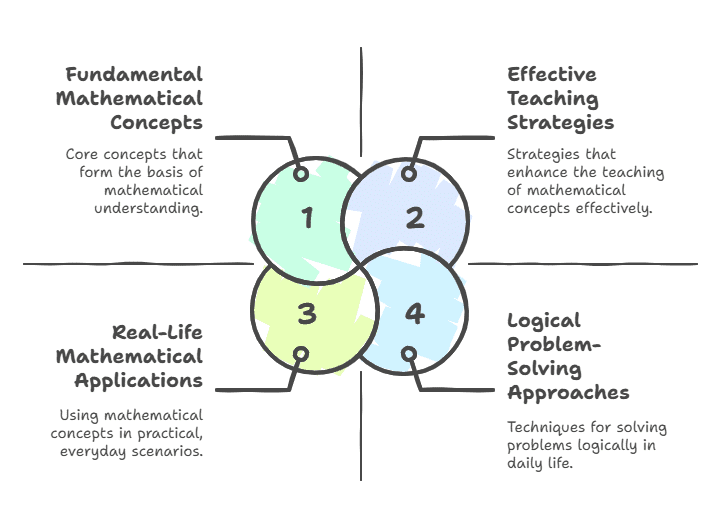How to prepare for Mathematics for Paper I and Paper II | How To Study For CTET - CTET & State TET PDF Download
Introduction
Mathematics is a crucial section in the CTET exam, testing conceptual clarity, numerical aptitude, and pedagogical understanding. Each Paper (Paper 1 and Paper 2) contains 30 questions from Mathematics, making it a scoring subject with the right preparation strategy.
EduRev, provides comprehensive resources, including chapter-wise notes, topic-specific video lectures, chapter-wise tests, and full-length mock tests to facilitate a structured and efficient approach to mastering this section.
Understanding Mathematics in CTET
Mathematics in CTET is not just about solving numerical problems; it also evaluates logical thinking, conceptual clarity, problem-solving abilities, and pedagogical skills required to teach mathematics effectively.
Conceptual Clarity: Understanding fundamental mathematical concepts and their applications.
Logical Reasoning: Developing problem-solving approaches using logical thinking.
Application-Based Learning: Applying mathematical concepts to real-life situations.
Pedagogical Aspects: Effective teaching strategies, assessment techniques, and error analysis.
Integration with Daily Life: Understanding how mathematics is used in everyday activities and integrating it into teaching.

Difference Between Mathematics in Paper 1 & Paper 2
| Aspects | Paper 1 (Primary Level) | Paper 2 (Upper Primary Level) |
|---|---|---|
| Target Age Group | Children aged 6-11 years | Children aged 11-14 years |
| Focus | Basic arithmetic, geometry, and measurement | Advanced mathematical concepts like algebra, mensuration, and data handling |
| Key Topics | Number system, addition, subtraction, multiplication, division, shapes | Algebra, geometry, symmetry, mensuration, data handling |
Although the topics differ in complexity, the logical approach and pedagogical principles remain common in both papers.
Combined Approach for Preparing Mathematics for Paper 1 and Paper 2
Study Common Concepts Together
Basic number system, arithmetic operations, measurement, and geometry concepts overlap between Paper 1 and Paper 2.
Use EduRev’s topic-wise video lectures and notes for conceptual clarity.
Differentiate Paper-Specific Topics
For Paper 1, focus on basic arithmetic, shapes, spatial understanding, and measurement.
For Paper 2, emphasize algebra, advanced geometry, mensuration, and data handling.
Topic-Wise Practice for Stronger Understanding
Attempt chapter-wise tests on EduRev to check conceptual grasp.
Solve previous years’ questions from both papers to identify important topics.
Mock Tests for Real Exam Experience
Attempt EduRev’s full-length mock tests to enhance speed and accuracy.
Analyze performance, identify weak areas, and revise accordingly.
Efficient Time Management
Study common topics first to avoid redundancy.
Allocate dedicated time slots for Paper 1 and Paper 2-specific topics.
Use EduRev’s interactive forums to clear doubts quickly.
Effective Preparation Strategy for Mathematics
Start with Fundamental Concepts
Read EduRev’s topic-wise notes for clarity.
Watch video lectures to understand problem-solving techniques.
Focus on important topics like number systems, arithmetic operations, and data handling.
Practice with Chapter-Wise Tests
EduRev provides Practice tests for each chapter.
After studying a topic, attempt its test to check understanding.
Identify mistakes and revisit related concepts.
Solve Previous Year Questions (PYQs)
Solve PYQs available on EduRev.
Attempt PYQs topic-wise to understand the weightage of different sections and also to understand about the types of questions usually asked in exam.
Attempt Comprehensive Mock Tests
EduRev offers CTET-based full-length mock tests which are based upon the latest pattern of the exam
Attempt at least one mock test per week and gradually increase frequency.
Analyze errors and revise weak topics before the final exam.
Pedagogical Mastery for Teaching Mathematics
Learn how to effectively teach mathematical concepts in classrooms.
Understand students’ common errors and strategies for error correction.
Practice framing conceptual and application-based questions for students.
Time Management and Daily Practice
Dedicate 1-2 hours daily to Mathematics preparation.
Maintain a formula notebook for quick revision.
Here you can also refer to EduRev's NCERT based PPts for quick revision of NCERT based concepts of Mathematics.
Participate in EduRev’s discussion forums for collaborative learning.
Why Mathematics is Important for CTET and Teaching?
Develops logical thinking and problem-solving abilities in students.
Helps in designing interactive and engaging math lessons.
Enhances a teacher’s ability to simplify complex concepts.
Strengthens assessment techniques for evaluating student performance effectively.
By following this structured approach using EduRev’s resources, candidates can develop a strong command over Mathematics, improve problem-solving skills, and maximize their scores in CTET. A focused and consistent preparation plan will not only help in cracking CTET but also in becoming a proficient and effective mathematics teacher.
|
1 videos|11 docs
|
FAQs on How to prepare for Mathematics for Paper I and Paper II - How To Study For CTET - CTET & State TET
| 1. What is the difference between Mathematics in Paper 1 and Paper 2 of CTET? |  |
| 2. How can I effectively prepare for Mathematics for both Paper 1 and Paper 2 of CTET? |  |
| 3. Why is Mathematics important for CTET and teaching? |  |
| 4. What are some effective preparation strategies for Mathematics in CTET? |  |
| 5. What resources can I use to prepare for the Mathematics section of CTET and State TET? |  |





















